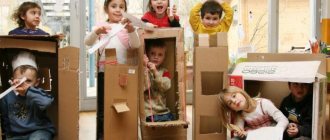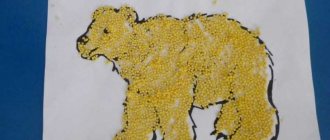Long-term plan of entertainment and leisure for the year (multi-age senior preparatory group)
Evgenia Velichko
Long-term plan of entertainment and leisure for the year (multi-age senior preparatory group)
Long-term plan for entertainment and leisure activities for different age (
senior - preparatory ) for the 2021–2022 school year .
Year Month Week Name of entertainment Program content
September 1 week Musical entertainment
"First day of knowledge"
Show children the social significance of the holiday - Knowledge Day; bring joy, create a cheerful festive mood; develop independence and initiative, artistic and aesthetic taste; cultivate neatness and friendliness.
Week 2 Leisure
"The red summer has passed"
Give children pleasure, create a joyful mood and a positive attitude through songs and dances.
Week 3 Sports festival “Journey to the land of health”
Improve skills in performing basic movements, develop physical qualities , consolidate knowledge about a healthy lifestyle, and cultivate mutual assistance in games and relay races.
Week 4 Entertainment “Road rules, all children should know!”
In a playful way, consolidate knowledge about traffic rules and road signs. Deepen your knowledge of street rules. To promote the development of caution on the roads, to cultivate attention and concentration.
Week 5 Congratulations to the entire team on “Preschool Worker’s Day!”
Foster a respectful, caring attitude towards preschool workers, create a positive emotional attitude.
October 1 week Musical festival
"Colors of Autumn"
To consolidate and clarify children's knowledge about plants, vegetables, fruits, and where they grow. To cultivate a caring attitude towards nature, which generously gifts us with its riches; respect for the work of people working on the land.
Week 2 Autumn holiday
“Autumn, dear rustle”
Create an emotional mood for children to say goodbye to autumn. To consolidate knowledge about the season - autumn with the help of a music and game program.
Week 3 Health Day “We love physical education!”
Increase motor activity, improve children’s motor skills and abilities, create a joyful, cheerful mood.
Week 4 of KVN
“Let's do arithmetic”
Develop visual perception, attention, a sense of teamwork and mutual assistance during leisure . Development of curiosity and cognitive motivation in children.
November 1 week Entertainment for National Unity Day
"My little homeland"
.
To instill good and patriotic feelings in children, to develop positive emotions from what they see.
Week 2 Game – quiz “We love fairy tales”
To evoke joy from meeting your favorite fairy tale characters, to form a stock of literary artistic impressions, to cultivate an interest in reading, a love of oral folk art, a desire to take part in team competitive games,
Week 3 Physical education
“For health in kindergarten”
Promote the comprehensive
development of motor skills, develop competitive skills, and cultivate a caring attitude towards one’s health.
Week 4 Musical holiday
"Mothers Day"
Create a favorable environment for communication, develop an ear for music , and instill in children a tender sense of love and respect for their mothers.
December 1 week Entertainment
"Fair of Games and Fun"
Continue to introduce children to winter games and fun and evoke positive emotions.
Week 2 Musical entertainment
"New Year's traditions in different countries "
.
Continue to introduce children to the folk customs of different countries , and also introduce them to Russian folk culture through musical activities.
Week 3 Physical education
"Looking for a Christmas tree"
Create an atmosphere of festive mood and promote a healthy lifestyle.
Week 4 Musical and theatrical performance “Little Red Riding Hood”
To develop children's speech and creativity, the ability to carefully follow the course of a fairy tale and the actions of fairy-tale characters ; improve communication and motor activity.
Week 5 New Year's party Create a festive mood, a sense of teamwork, evoke an emotional response
January 1 week “Christmas gatherings”
— Carols Forming the desire to actively participate in
entertainment , communicate, be friendly and responsive.
Week 2 Entertainment Traffic rules
"On the Road to Adventure"
Reinforce the rules of the road, develop artistic and speech performing skills.
Week 3 Game reenactment
“How the sun and the frost quarreled”
. Arouse interest in theater and theatrical activities.
February 1st week Zarnitsa “Russian fighter is a model for everyone”
Improve the technique of basic movements, achieving ease, accuracy, and expressiveness in their execution. Strengthen the skills of performing sports exercises, cultivate endurance, perseverance, and determination.
Week 2 Leisure
“Fire is a man’s friend, just don’t touch it in vain!”
To consolidate knowledge about fire safety rules and rules of conduct in case of fire; cultivate respect for the work of firefighters.
Week 3 Matinee for Defender of the Fatherland Day
“We are faithful sons of the Fatherland”
Develop imagination and creative abilities; consolidate knowledge about the history of the Russian army; to cultivate accuracy, determination, and pride in the Fatherland using the example of the exploits of soldiers who defended the Motherland in different periods of history.
Week 4 Musical entertainment
"Maslenitsa"
(Farewell to winter)
Develop interest in educational entertainment that introduces the traditions and customs of the Russian people, the origins of Russian culture, to develop a sense of involvement in the events that take place in kindergarten and family;
create an environment of emotional well-being, provide children with the opportunity to relax and gain new experiences. March 1 week Matinee dedicated to International Women's Day Create a joyful mood in children, cultivate a respectful attitude towards all women in the world. Develop love and kindness towards your mothers and grandmothers.
Week 2 Theatrical performance
"Journey to the Land of Fairy Tales"
To generalize children's knowledge about fairy tales, to develop the ability to recognize fairy tales and their characters, to develop creative imagination and associative memory. Foster the need to read books. To cultivate a love for oral folk art, for fairy tales of various writers.
Week 3 Theme evening
“All professions are important, all professions are needed”
Expand cognitive interest in professions;
respect and value each profession; to develop respect for the work of adults in different professions .
Week 4 “Water Day - March 22”
Musical entertainment
"Travel with Droplet"
Formation of a system of consciously correct ecological ideas about nature in preschool children, creation of conditions for the formation of elements of environmental culture in the child.
Week 5 Leisure “Mysteries of Spring”
Create a joyful mood in children,
develop cognitive interest in the natural world around them, and cultivate a sense of respect for comrades and play partners.
April 1 week Musical entertainment
"Humor in our lives"
To develop in children sociability, the ability to correctly perceive humor, to form emotional responsiveness to the nature of music, to improve dance movements using previously acquired skills.
Week 2 Entertainment “Space Travel”
Develop the ability to show imagination and creativity, give children the joy of interacting with each other in motor play activities.
Week 3 Leisure
“Be polite”
Develop communication skills, stimulate children’s emotional empathy with their peers. Develop good relationships between children.
Week 4 Health Day
"Fun Starts "
Improve the technique of passing the baton, develop the ability to compete.
Develop speed-strength and motor qualities, promote endurance, perseverance and independence.
May 1 week Music room
"Evening of songs of the war years"
Forming in children an idea of what the Great Patriotic War was; activate children's vocabulary; to cultivate love for the Motherland, pride in the victory of the Russian people in the Great Patriotic War. Introducing children to songs written during the war, showing illustrations.
Week 2 Physical education
"Birthday of the Fly Tsikotukha"
To contribute to the formation of the foundations of a healthy lifestyle, children’s emotional and positive response to fun
activities based on outdoor games and exercises.
Week 3 Game - dramatization based on the fairy tale “Under the Fungus”
Creating favorable conditions for creative activity in children through theatrical activities, developing in children an interest in play - dramatization, the ability to improvise to music. Activate people's speech activity.
Week 4 Graduation party Create a cheerful mood in children and parents, develop interest in musical activities.
Holiday planning
Planning the educational process in preschool educational institutions based on calendar holidays.
In our kindergarten, along with weekly calendar-thematic planning of the educational process, holiday planning is widely used, with the help of which teachers expand students’ understanding of the events of Russian and world holiday culture; introduce you to holiday etiquette, rituals, and customs; introduce you to the diversity of professions and working people; foster a desire to cherish and protect the surrounding nature, a positive attitude of the child towards himself and the people around him, tolerance, friendliness, a desire to bring joy to people and share it with others, empathy, care; strengthen family values by involving parents in active cooperation; enrich vocabulary, develop children's creative abilities; cultivate aesthetic feelings and love for art.
Since ancient times, holidays have been the basis of human culture. The holiday calendar includes a huge number of different celebrations, which differ in their history, have their own traditions, rituals, carry various functions, many of them are entertaining in nature. There is a festive culture, which includes traditions, customs, rituals, and festive etiquette.
During the calendar year, using a monthly list of holidays that are understandable to preschoolers, we introduce children to the main international, state, national, and professional holidays both during organized educational activities and in their free time. Particular attention is paid to telling stories to children, conversations, reading fiction, viewing illustrations, presentations, videos, animated films, role-playing games, productive activities for students, regular entertainment and festive events, organizing exhibitions of crafts and drawings.
Children get acquainted with professional holidays: Day of preschool workers, post office, air traffic controller, cook, police, rescuer, dentist, nurses, fire department; with environmental holidays: Day without a car, sea, animals, nature reserves, cats, Earth; with social holidays: Day of Peace, the Elderly, the Disabled, Tolerance, Hugs, Thank You, Smiles, Human Rights, Family, Mother in Russia; with cultural holidays: Day of beauty, music, architecture, theater, museums, libraries; with educational holidays: Day of planetariums, children's television and radio broadcasting, animation.
When introducing students to holiday culture, we implement many ideas. Thus, we traditionally celebrate Mother’s Day in Russia with a concert program, which is attended by mothers and the rector of the Intercession Church, John Bakushkin. The priest talks with the children and instructs them, reminding them that it is important not only to accept mother’s love with gratitude, but also to take care of the mother yourself: try not to upset her, always take care, help, please. In November 2022, before this wonderful holiday, as part of the parent club in our preschool educational institution, the project “I bake with my mother” was implemented. The children of the “Bunnies” group, under the guidance of their skillful mothers, baked cakes, pies, cookies, and pastries at home. At the end of the matinee, preschoolers were shown a video that captured this fascinating process in different families. And then children and adults went to tea, where everyone appreciated the masterpieces of baking.
On Rescuer Day of the Russian Federation, we met people of heroic professions. Employees of the Center for Prevention and Response to Emergency Situations and members of the fire brigade came to visit us. With great interest, preschoolers studied means of rescuing drowning people, the structure of a fire engine, and repeated various rules of safe behavior indoors, outdoors and in nature.
International Mother Language Day was celebrated by watching a presentation and conversation on the topic “Treasury of the Russian Language” and getting acquainted with educational cartoons from the “Our Friend Pishichitai” series.
On World Marine Mammal Day, educators told children about how important it is to protect these animals. Next, productive types of children's activities were organized: the kids of the "Cherry" group drew whales using cotton swabs and gouache, the middle group "Squirrels" painted images, the senior group "Bunnies" performed a collective cut-out appliqué "Cheerful Whale".
In this way, we help preschoolers expand their understanding of professional holidays, holidays related to nature, science and technological progress, and the preservation and promotion of health. The students delight us with their interest, activity, patriotic spirit, social and moral feelings, and manifestation of creative abilities.
Pedagogical diagnostics includes several types of tasks: these are questions with expected specific answers, reflecting children’s ideas about holidays; questions for reflection, comparison, choice situations; tasks to reveal creative abilities. It allows you to determine the knowledge, abilities, skills of children on issues of festive culture, identify the social and moral position, the level of formation of moral and emotional feelings, imagination, arbitrariness - perseverance, accuracy, the desire to plan the stages of their activities and bring the work started to the end.
Diagnostic questions and tasks
1. What is a holiday?
Why do people need holidays? How do you understand the expression “holiday mood”? 2. Name the types of holidays. 3. What refers to the state symbols of Russia? 4. List the calendar public holidays of the Russian Federation. 5. What Russian folk holidays do you know, and at what time of year are they celebrated? 6. What international holidays do you know? 7. What applies to living and what to inanimate nature? 8. What holidays related to nature do you know? 9. Word game “What does anyone need for work.” The presenter names the profession, the child names the helper items, then the players change places. 10. List professional holidays. 11. Remember the symbols, attributes of several holidays of your choice (for example, New Year - a decorated tree, Maslenitsa - pancakes, Victory Day - the Eternal Flame). 12. What family holidays do you celebrate with your relatives? 13. How should you prepare for a festive reception of guests? 14. How should you prepare for a holiday visit? 15. Do you like to give gifts? 16. Do you like to receive gifts? 17. Think about what gifts would be suitable for these holidays: Knowledge Day, Mother’s Day, New Year, Defender of the Fatherland Day, International Women’s Day, World Theater Day, April Fool’s Day, World Health Day, Easter, Victory Day, International Family Day, Birthday . 18. What holidays did we celebrate this year in kindergarten, which one do you remember most and why exactly? 19. Name your favorite holiday. 20. Which holiday is the most exciting for you? 21. Which holiday do you consider the most important, important? 22. Read a poem you learned for any holiday of your choice. 23. What holiday songs do you know? 24. Come up with a holiday wish. To whom is it addressed and for what occasion? 25. What holiday gifts did you give in kindergarten and what at home? 26. The child is given a choice of a variety of materials for handicrafts: paper of different types and colors, pencils, paints, felt-tip pens, brushes, scissors, glue, plasticine, material for decorations, and is invited to make and design a card for any holiday for the person for whom the child wants to give it to you. The results are assessed as follows: if the child independently copes with tasks, answers in detail and quickly enough, has a large amount of information and willingly shares knowledge, reasoning, using concepts, notations, shows creativity, the teacher notes a high level of knowledge, skills and abilities on the topic diagnostics At an average level of knowledge, children cope with tasks with the help of a teacher, and find it difficult to answer many questions. Children with a low level of learning ability cannot cope with most tasks, even with pedagogical help. The teacher’s task is to develop the child’s skills so that his level becomes higher than the level diagnosed at the beginning of the school year.
Systematic, based on the age-related characteristics of children's development and the principles of didactics, methodically correct introduction of preschoolers to festive events of national and world scale makes it possible to include children in the current system of social relations, broaden their horizons, prepare them for successful learning at school, lay the foundations of morality, patriotism, and tolerance. , which will further help raise worthy citizens, full-fledged and full-fledged members of the world community.
This planning makes it possible to implement important tasks in accordance with the Federal State Educational Standard for Education: nurturing a culture of children’s personalities, improving their morality and spirituality, enriching children’s knowledge about themselves and the world around them.
List of holidays that can be included in the educational process in a preschool organization
September
1 - Knowledge Day 8 - International Literacy Day 9 - International Beauty Day 21 - International Peace Day 22 - World Car Free Day 26 - World Sea Day 27 - Day of Teachers and All Preschool Workers
October
1 — International Music Day, World Architecture Day, International Day of Older People 4 — World Animal Day 5 — World Smile Day, Teacher’s Day 6 — World Habitat Conservation Day 9 — World Post Day 20 — International Air Traffic Controller Day, International Chef Day 28 — International Animation Day
November
4 — National Unity Day 10 — Police Day 16 — International Day of Tolerance 18 — Father Frost’s Birthday 21 — World Greetings Day, World Television Day 25 — Mother’s Day in Russia 26 — World Information Day
December
3 — International Day of Persons with Disabilities 10 — Human Rights Day, World Football Day 12 — Constitution Day of the Russian Federation 15 — International Tea Day 27 — Russian Rescuer Day 28 — International Cinema Day
January
1 - New Year 7 - Christmas Eve and Christmas 7-19 - Christmastide 11 - International Thank You Day, Day of Nature Reserves and National Parks 14 - Old New Year 19 - Epiphany 21 - International Hug Day
February
2 — Day of Military Glory of Russia 8 — Day of Russian Science 9 — International Dentist Day Maslenitsa 21 — International Mother Language Day 23 — Defender of the Fatherland Day
March
1 - Cat Day 3 - World Writer's Day 3 - International Day of Children's Television and Radio Broadcasting 8 - International Women's Day 14 - International Rivers Day 15 - World Sleep Day 17 - International Planetarium Day 21 - World Poetry Day, International Puppeteer Day 27 - World Day theater
April
1 - April Fool's Day, International Bird Day 2 - International Children's Book Day 7 - World Health Day 12 - World Aviation and Space Day 18 - International Day of Monuments and Historic Sites 22 - International Earth Day 29 - World Dance Day 30 - Firefighter Day 31 — Easter (check the date according to the church calendar)
May
1 — Spring and Labor Day 3 — Sun Day 7 — Radio Day 9 — Victory Day 12 — International Nurses Day 15 — International Family Day 18 — International Museum Day 24 — Day of Slavic Literature and Culture 27 — All-Russian Library Day
June
1 - International Children's Day 5 - World Environment Day 6 - Pushkin Day of Russia (Russian Language Day) 9 - International Friends Day 12 - Russia Day 23 - International Olympic Day
July
3 - Traffic Police Day 7 - Ivan Kupala 8 - All-Russian Day of Family, Love and Loyalty 11 - World Chocolate Day 20 - International Chess Day 23 - World Whale and Dolphin Day 28 - Navy Day Russian Post Day - second Sunday in July
August
5 - International Traffic Light Day 10 - Sportsman's Day 14 - Honey Spas 18 - Russian Air Fleet Day 19 - Apple Spas 22 - National Flag Day of the Russian Federation 29 - Nut Spas Builder's Day - second Sunday in August
Lyudmila Korotkova, senior teacher,
MDOU D/s No. 9 “Friendship” p. Cherkizovo Kolomenskogo city
“Organization of holidays for preschool children in accordance with the Federal State Educational Standard for Education”
A game
at a children's party acts, on the one hand, as a method of activating the child, on the other hand, as an important form of mastering cultural forms of behavior. Collective games are characterized by eventfulness, plot, action, and imagery. Emotions “cement” the game, make it exciting, and create a favorable climate for communication. It is important to captivate children and make sure that the end of the game is not drawn out, but is characterized by brightness, emotional richness, and effectiveness.
Entertainment
Entertainment, as one of the types of cultural and leisure activities, is of a compensatory nature, compensating for the costs of everyday life and monotony of the environment. Entertainment should always be a colorful moment in the lives of children, enriching impressions and developing creative activity.
When organizing entertainment of the first type in order to activate children, they are involved in the design of the hall or group; production of attributes or invitation cards. In this type of event, the cultural and leisure activities of preschoolers are somewhat limited: they are mainly spectators, and receive a positive emotional mood in the process of perception.
Types of entertainment according to the degree of activity of children's participation
children are only listeners or spectators
children are direct participants
participants – adults and children.
The second type of entertainment makes it possible to include children more widely in the process of preparation and performance. They themselves prepare numbers for performances, stage performances, act out roles, and take an active part in various games. This type of entertainment allows the teacher to find something to do for each child, which has a positive effect on the formation of the foundations of an individual’s culture.
The third type is mixed. It allows children to expand their communication with adults and peers, which is so necessary for the overall development of preschoolers. Involving parents in this section of the teacher’s cultural and leisure activities is a good way for the kindergarten to work with the family.
Such events are usually held in the afternoon. In this case, the teacher must take into account the time of year. Once a week it is advisable to hold a longer (30–35 min) entertainment event with a greater emotional load, and on other days offer short (5–10 min) fun activities: small surprises, jokes, jokes, nursery rhymes, riddles, shows tricks and improvisational scenes from the life of a kindergarten or based on literary works.
Parental Involvement
Preschool childhood is a favorable period for introducing children to the origins of musical culture. Experience shows that parents are interested in the in-depth musical development of the child and are ready to participate in joint activities in kindergarten. The main task of children's musical development is the formation of the foundations of musical culture, the moral and aesthetic development of the personality of a preschooler. Her solution is aimed at the joint organization of musical activities of children, teachers, music director and parents. Through joint efforts, this process is carried out more successfully; the union of like-minded adults allows us to achieve the best results in the musical development of children.




